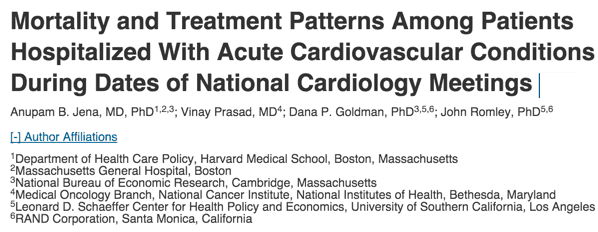
How would you like a simple treatment that can improve your medical results whether it’s surgery or medication by almost 25%?
This simple treatment will work in virtually any hospital, or doctor’s office, anytime, and it’s been studied.
One of the chief investigators in the study writes about it:
“That’s a tremendous reduction in mortality, better than most of the medical interventions that exist to treat these conditions.”
Yes, this quote comes from one of the study’s authors, a study that is more amazing than almost anyone that I’ve reviewed in months.

Let me break this down for you and make it simple. They compared the results of patients admitted into some major hospitals for heart problems, including heart attacks.
The patients were monitored, as to whether or not they were in the hospital when most of the cardiac surgeons and cardiologists were away at professional meetings.
The study investigators figured that when most of the expert doctors are away at a professional meeting, the patients were admitted to the hospital with heart emergencies will die at a higher rate because the experts are not there to attend.
What they found startled and shocked everybody.
Unadjusted 30-day mortality was lower among patients with high-risk heart failure or cardiac arrest admitted to major teaching hospitals during meeting dates.
In plain English, death rates for heart attack were much lower when the heart experts were not in the hospital treating the patients.
The difference was startling, about 24% improvement in mortality when the cardiologists were absent, then when they were there!
There could be several reasons why people got better care when the expert doctors were gone from the hospital.
But the fact is, the experts were not there caring for them, and the patients did MUCH better.
The most obvious reason that you’re going to get better care when you’re expert doctor is not there, is
The experts over treat and mistreat
This is a recurring theme of our newsletter: The experts do not know what they are doing.
The experts are often over-treating and mistreating patients.
The people who had heart attacks went into the hospital and were treated by general residents, and non-specialists and these patients were much better off than the ones who were treated by expert cardiologists.
And the biggest reason for this, maybe, is that the non-specialists were more careful, they were less aggressive, they were more conservative, and they let the patients heal themselves more than the cardiologist and heart specialists, who over-treated and aggressively mistreated the cases.
And this mistreatment resulted in a 24% higher mortality rate than the “under-treated” patients attended by (more cautious?) non-expert physicians.
What to do next
Keep reading this newsletter. Keep your mind open. Don’t just go to the doctor and take their advice.
I’m not supposed to tell you to not listen to your doctor, and I wouldn’t say that, but the more you know, and the more cautious you are, the smarter your outcomes and the better your outcomes are likely to be.
————–

- Mortality and Treatment Patterns Among Patients Hospitalized With Acute Cardiovascular Conditions During Dates of National Cardiology Meetings
http://archinte.jamanetwork.com/article.aspx?articleid=2038979 - When the doctor’s away, the patient is more likely to survive Deaths due to heart problems drop during major cardiology gatherings
http://arstechnica.com/science/2014/12/when-the-doctors-away-the-patient-is-more-likely-to-survive/
- Overtreatment in the United States - NCBI
https://www.ncbi.nlm.nih.gov/pmc/articles/PMC5587107/ - Doctors often don’t reveal cancer test overtreatment and harms
https://www.health.harvard.edu/blog/doctors-often-dont-reveal-cancer-test-overtreatment-and-harms-201310226790
